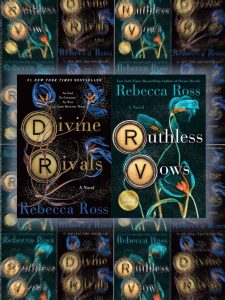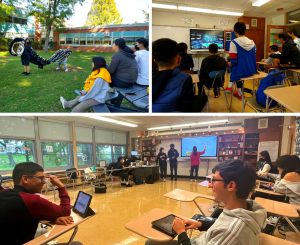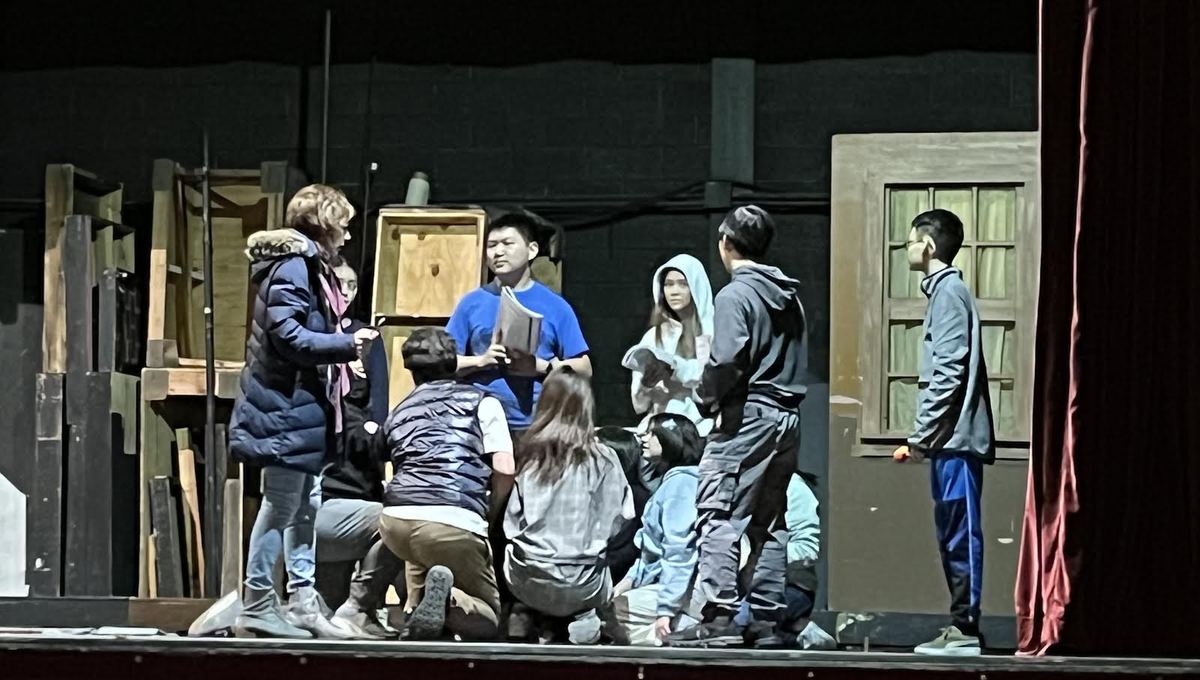By Michelle Yang
“Yesterday I wanted to / speak of it, that sense above / the others to me / important because all / that I know derives / from what it teaches me,” junior Vanna Qing recited. The lines are the opening to the poem “For Love” by Robert Creeley. Qing was one of three students—the other two being junior Haley Roach and senior Jay Zussman—who performed a spoken word poem at South’s recent fall Coffee House. The three belong to the new Spoken Word Poetry Club, formed this year by senior Katie Tan.
Spoken word poetry—the name itself may provoke perplexed looks. Simply put, spoken word is performance-based poetry, an art form synthesizing elements of theatre, dance, and music, or as Tan puts on the first handout of the club, “you.”
“I’ve always been interested in poetry and writing and things like that,” Tan said. “But when I started to do theater, I realized performing can be so much more than reading from a script.” She became specifically interested in spoken word last year when she watched a TEDtalk by Sarah Kay, a spoken word poet at the forefront of the rising movement trying to encourage people to listen to and watch spoken word poetry. Intrigued and inspired, Tan realized vSouth did not have a club dedicated to this type of performance and thus decided to form one on her own.
The Spoken Word Poetry Club’s purpose is to provide a platform for students to express themselves, to think about what is important to them or what they are passionate about, and share it with an audience. “As an avid writer, the idea of direct verbal connection with my audience represents an incredible opportunity,” said Zussman, who performed a poem entitled “The Obligation to be Happy” by Linda Pastan at South’s recent fall Coffee House.
In addition, and maybe more importantly, Tan sees the club as a way to address social issues. “The first step to growing up and dealing with [social issues] is to first be aware of [them] and develop an attitude towards [them] because if you are apathetic, nothing will happen. You won’t be for it, you won’t be against it, and you become a bystander.”
Spoken word can even be for shyer students. “Ever since I was young, I was pretty introverted,” Tan recalled. “So [being] able to get up onstage and have everyone’s attention on me…to say things that are important to me and have people nod along and clap afterwards is just incredibly validating. It makes me feel powerful and like everything was worth it.”
The club can really be for everyone and anyone. “There’s dance, there’s music, there’s theater, there’s poetry: there’s something for everyone. Anything you’re interested in can be incorporated into spoken word,” Tan said.
Tan structures the club around what the members want, usually performance and writing workshops. Performance workshops allow club members to pick a poem, either written by someone else or themselves, and perform it, working on communicating the subtleties and emotions of the poem through tone dynamics and gestures. Writing workshops focus on transforming one’s passion into poetry. “I believe that no matter what the topic is, it’s going to have to be something you feel strongly about, otherwise the performance will fall flat,” Tan said. “The writing may be good, but people won’t be able to connect with it.”
One of Tan’s goals for the burgeoning club is for at least half the club to perform his or her own piece at the next Coffee House, which will take place in the spring.
Her ultimate goal for the club this year is to get involved in the Poetry Out Loud competition, where spoken word poets select one or two poems from the Poetry Out Loud anthology and perform it on a competitive level. She expects the school competition to be held in November and hopes that students not involved in the club will show up to either watch or perform. She also hopes to send someone to regionals.
Tan feels that “spoken word…reminds people that they have emotion, and that there are other people out there who are struggling and celebrating, and that people should join that.”
Even for students hesitant about joining, Tan said, “At least come in and watch us because I think this will be big. I think this will be important.”
Spoken Word Makes a Slamming Start At South
December 3, 2014











